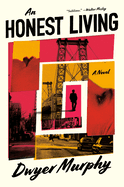
Though it's probably too soon to feel nostalgia for 2005, when Dwyer Murphy's An Honest Living begins, this territory-marking debut is seductively steeped in motifs reminiscent of the golden age of noir. Fans of the genre will likely be nodding appreciatively from the introduction of a mysterious woman out to get her husband, which launches this story, to the concluding shot of a vintage car.
The narrator, whose name recalls the author's, is a Brooklyn-based lawyer. Disillusioned with corporate life, he's forging a solo practice. As the novel opens, he's at a private library in Manhattan where book dealers and aficionados are gathered: his new client is paying him $10,000 to catch her dealer husband trying to sell some rare books that belong to her. "Something about the case bothered me from the start," admits the narrator. "Whatever it was, I managed to put it out of mind." Naturally, he shouldn't have done that.
An Honest Living checks every noir box but one. In one of the novel's meta moments, a literary novelist explains why she's writing a crime novel: "There's something to be said for that kind of efficiency." Efficiency isn't what Murphy is going for: the novel has a languid pace, with stops for digressions. But readers' patience will be reliably rewarded not just by the noirish touches but also by the impeccable sentences, which often capture ever-changing New York: "Around us was empty air and dug-out earth but you could almost feel the buildings underfoot, ready to break through the surface like stalks looking for sun." --Nell Beram, author and freelance writer

